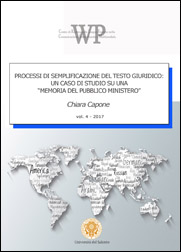
ISSN: 2499-1449
ISBN: 978-88-8305-124-1
DOI: 10.1285/i24991449n4
Legal language is a specialist language. In particular, also this specialized language has features which are specific to the lexical, morphosyntactic and stylistic levels: the first serves to satisfy the need for a specific language to code a subject as complex as jurisprudence; at the morphosyntactic level, although not always necessary, they are used to the extent that they serve to express a certain meaning. However, there are instances where the fixed phrases and language usage typical of legal language have no semantic function relevant to legal communication: in these cases, the specialty of legal language essentially translates into a choice of style and its peculiar constructions can be replaced by an expression of common language taken from a less high register, without the legal meaning of the clause structure to which they belong being altered or compromised. Instead, style concerns the form of the legal proposition.
Legal certainty has often been transformed into a dense tangle of legal regulations which are, by their nature, difficult to decode.
Both in Italy and in other European countries and beyond, the legal language of public administration has been and continues to be studied. Italy is a bit late compared to other European countries but the problem does not lie just in a syntax which is too complex; at heart, it proves highly difficult to organize information in a communicative manner in order to form texts that effectively perform the function of informing or giving directions to a recipient who has neither special skills of interpretation nor any technical preparation.
In the light of these considerations, objective of this case study is to apply to a legal text - in this case, an "Act of the Public Prosecutor" - the principles of linguistic simplification so as to make the legal discourse cognitively accessible to all possible recipients and linguistically understandable concepts of specialized level.
Table of Contents
| Frontespizio |
PDF
|
|
Chiara Capone |
|
| Abstract |
PDF
|
|
Chiara Capone |
1 |
| Presupposti teorici |
PDF
|
|
Chiara Capone |
2-5 |
| Caso di studio: “Memoria del Pubblico Ministero” |
PDF
|
|
Chiara Capone |
5-33 |
| Analisi dei processi di semplificazione linguistica applicati al testo in esame |
PDF
|
|
Chiara Capone |
33-38 |
| Conclusioni |
PDF
|
|
Chiara Capone |
39-40 |
| Riferimenti bibliografici |
PDF
|
|
Chiara Capone |
41 |
| Colophon |
PDF
|
|
Chiara Capone |
|
Questo sito utilizza un cookie tecnico per consentire la corretta navigazione. Se vuoi saperne di più consulta l'
informativa estesa.
e-ISSN: 2499-1449
 ISSN: 2499-1449
ISSN: 2499-1449
